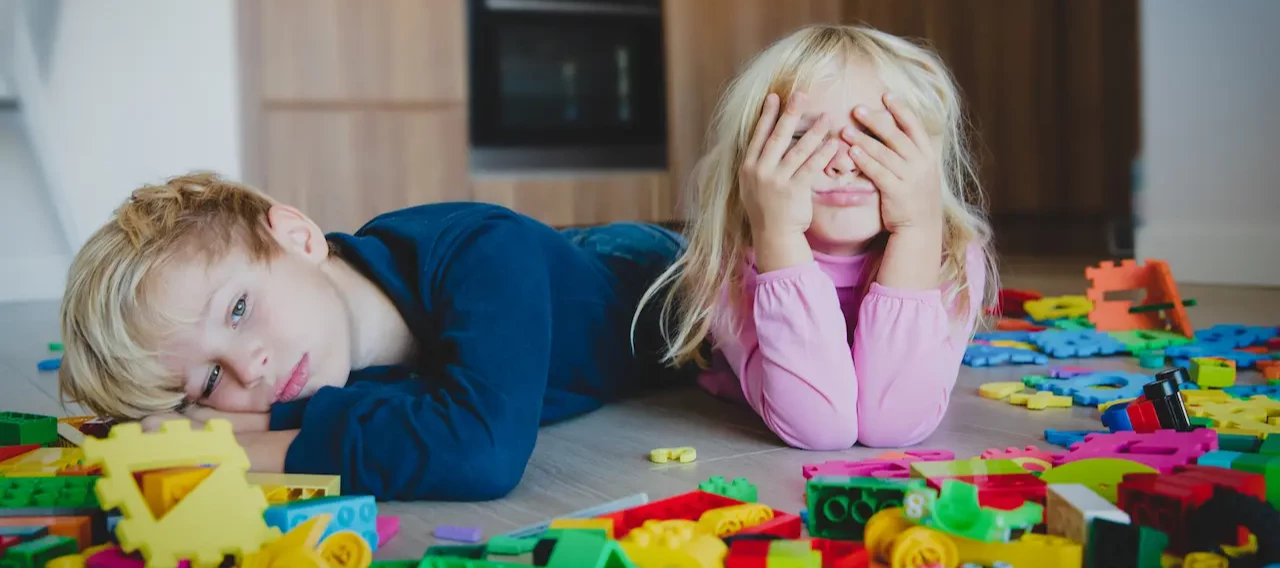Sub total: 0.00 BGN (0.00 €)
When “I’m bored” becomes too frequent
Sounds familiar, right? “Mom, I’m bored…” – said barely five minutes after you’ve offered a game, a book, or a walk. Nowadays, children getting bored quickly isn’t unusual, but sometimes it raises concerns and questions like: “Is this normal?”, “Could it be an attention issue?”, “Or is it simply how a child’s brain works?”
In this article, we’ll explore what lies behind children’s boredom and why some lose interest so fast. We’ll also share how parents can respond with understanding, patience, and the right strategies – including the use of sensory and educational toys.
Why do children get bored so quickly?
Young children are like little explorers – curious, impulsive, with a short attention span. This isn’t a flaw but a natural part of early childhood development. Their brains crave novelty and variety. That’s why one activity may fascinate them for a moment and then suddenly lose all appeal.
In addition, kids often struggle to regulate their attention or come up with ideas for what to do without constant stimulation. If they’re used to screens, flashy toys with lights and sounds, or too much adult direction, it can actually fuel their tendency to get bored faster.
Is it normal for a child to feel bored?
Absolutely – boredom can be beneficial. It encourages imagination, independence, and creative thinking. The problem arises when a child cannot move through the moment of boredom and instead reacts with irritability, aggression, or complete inactivity. In such cases, it’s worth looking closely at their routine, sources of stimulation, and emotional needs.
Possible reasons behind frequent boredom
- Overstimulation from screens or noisy toys, which makes “quiet” activities less appealing.
- Lack of structure and predictability, which help children feel secure and engaged.
- Underdeveloped skills for independent play – if an adult always leads, the child doesn’t learn to come up with activities on their own.
- A naturally low tolerance for patience and concentration, which can be nurtured through practice.
- Unmet needs for movement, sensory input, or social interaction.
The role of routine and daily habits
One common reason children get bored quickly is the absence of a clear daily structure. When there are established times for meals, play, learning, and rest, kids feel safer and know what to expect. This predictability helps them stay engaged, and transitions between activities become smoother. Small rituals – such as bedtime reading or a morning walk – can reduce the constant “I’m bored” and give stability to everyday life.
Movement as a natural response to boredom
Often, boredom signals a need for more physical activity. When energy has no outlet, attention scatters, and children lose interest in quieter tasks. Even short bursts of movement can release tension and restore focus. Afterwards, kids are more willing to engage in constructive and calm activities because they’ve satisfied their natural need for motion.
How can we, as parents, help?
1. Accept boredom as normal
Don’t panic when your child says they’re bored – it’s not a failure in parenting. Instead of instantly offering something new, ask: “What would you like to do?” or “What can you come up with on your own?”
2. Encourage independent play
Allow space for free play without strict rules. This teaches children to be creative, to problem-solve, and to invent their own scenarios.
3. Limit screen time
Screens provide overstimulation and often lead to “attention burnout.” Kids get used to quick, flashy images that hold their interest only briefly. Gradually reducing screen time and replacing it with outdoor games, drawing, building blocks, or sensory toys gives their brains a break and helps them focus longer on one task. Over time, they develop patience, imagination, and self-directed play – all valuable life skills.
4. Include sensory and motor activities
Sensory play is a great way to support focus and help regulate sensory needs – especially for children who quickly lose interest or require stronger stimulation. Busy boards, sensory panels, and objects with different textures, shapes, and mechanisms create a rich environment for exploration. They don’t just entertain briefly but challenge children to discover, experiment, and return for new challenges again and again.
What is the role of busy boards in fighting boredom?
A busy board doesn’t provide ready-made solutions – it encourages the child to explore and experiment independently. That’s one of its biggest strengths: the child isn’t just playing, but actively learning and building experience. Here’s why it’s so valuable:
- Teaches patience and persistence, since tasks take time and attention.
- Provides opportunities for focus and repetition of movements, strengthening concentration.
- Requires no electronic stimulus or constant adult guidance – the child can engage on their own.
- Works simultaneously on fine motor skills, logical thinking, and sensory activity.
- Builds confidence and satisfaction because every “discovery” feels like a personal achievement.
Over time, the busy board becomes more than just a toy – it’s a tool that holds attention and channels energy in a constructive way.
Boredom is not the enemy, but an opportunity
When our child gets bored quickly, it’s not always a problem – sometimes it’s an invitation to help them explore the world differently. With the right approach, patience, and educational play, we can create an environment where boredom transforms into creativity, learning, and growth. In such a setting, children not only have fun but also develop into confident, calm, and focused individuals.




